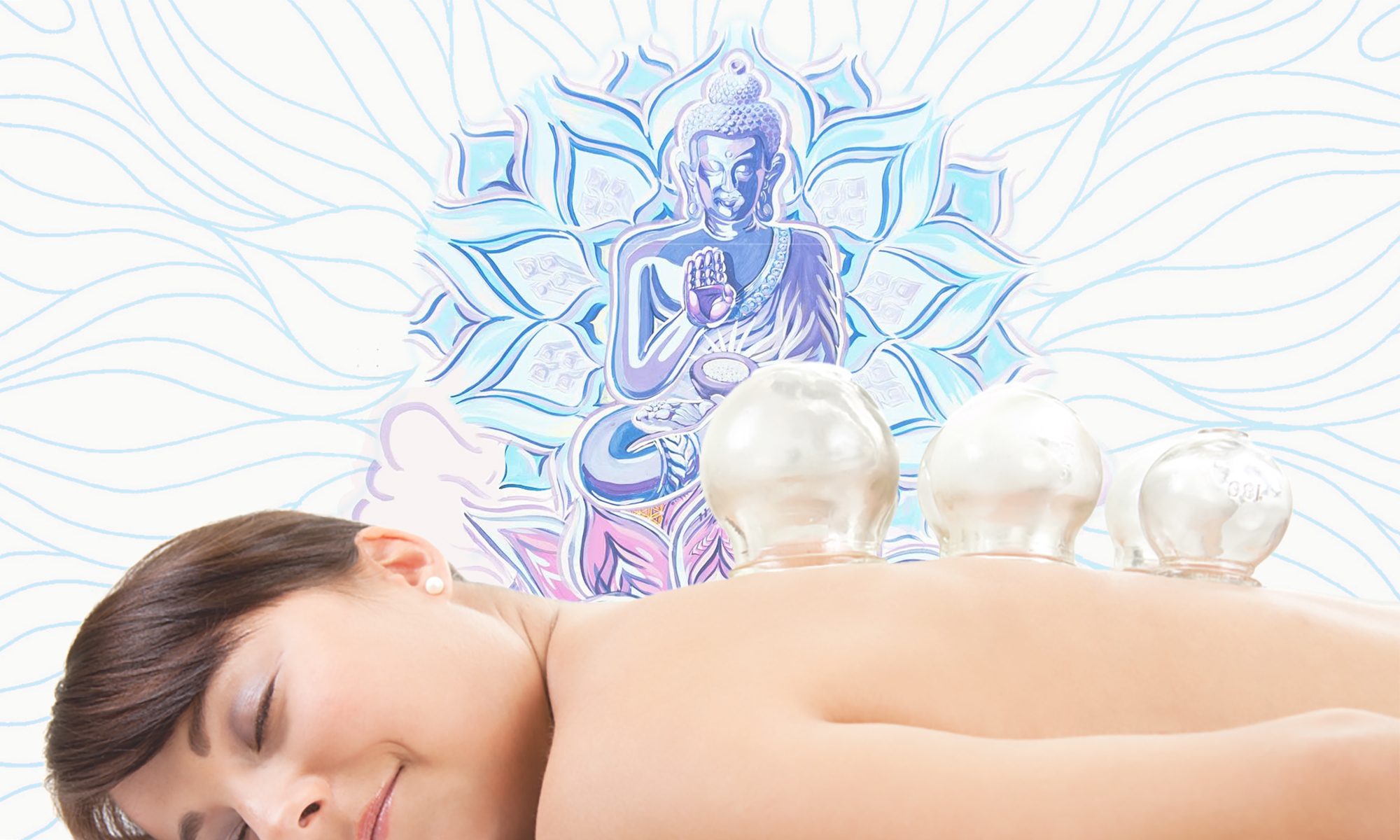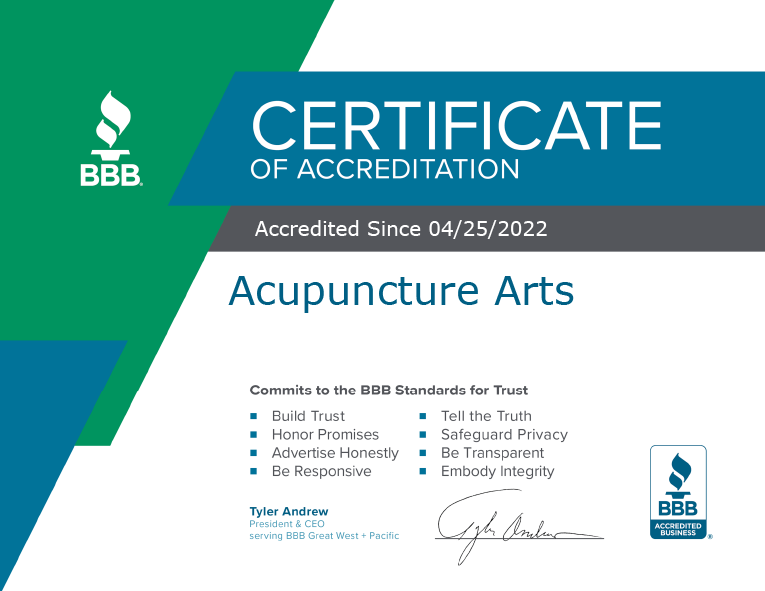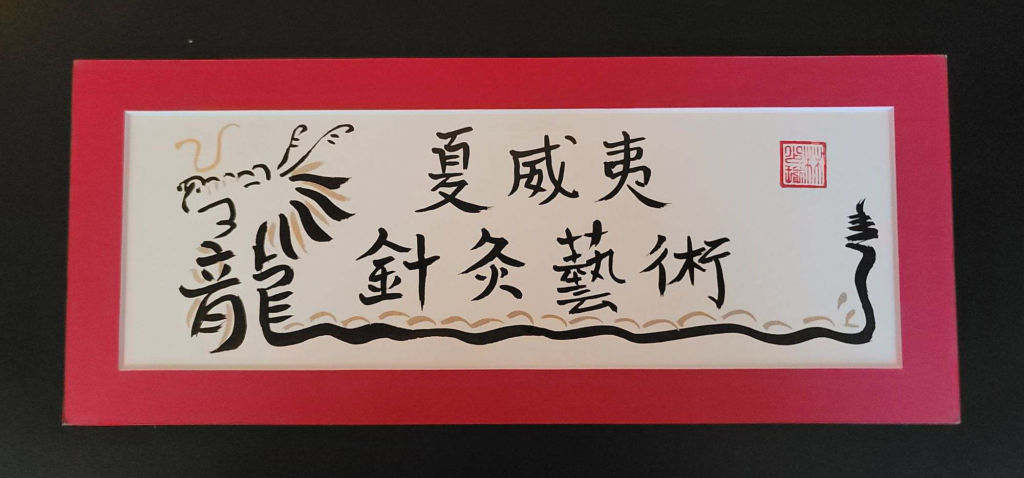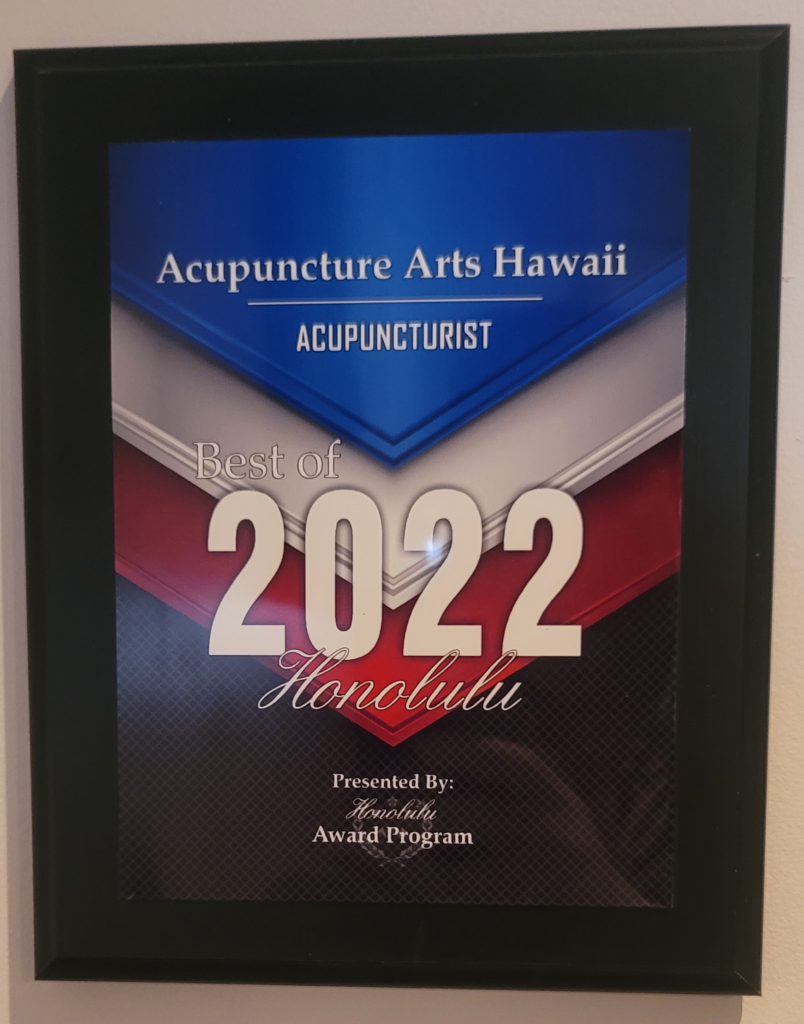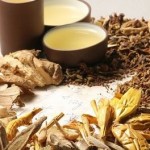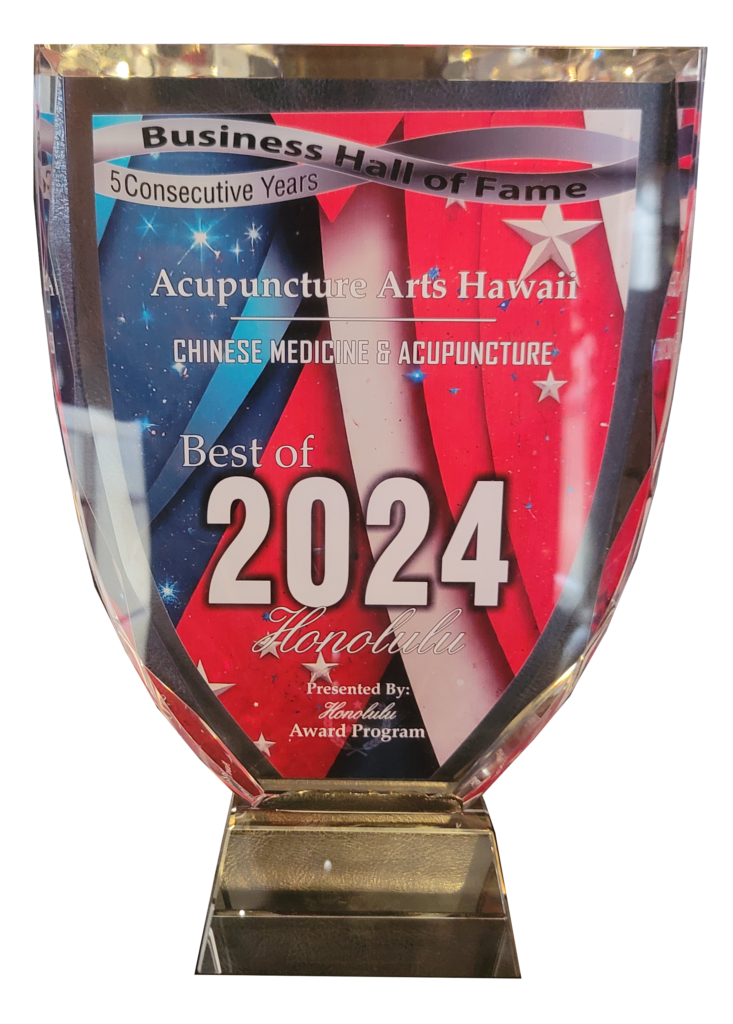
Accredited with an A+ Plus Rating with the Better Business Bureau since 2022
Happy Lunar New Year! Year of the Dragon Special: 20% OFF Any Service / Treatment for New & Existing Patients
Voted Best Acupuncturist in Honolulu 8 Years in a Row! by Honolulu Magazine & Expertise.com
New Free and Donation Based Community Acupuncture
At Acupuncture Arts Hawaii we know times are hard and it’s even harder to take care of yourself in these hard times. We are now offering Free and Donation Based Community Acupuncture.
Patients sit in a room as a group and receive auricular (ear) acupuncture. Patients are asked to donate what they can. Suggested donations are $25-$50, however no patients will be turned away for not being able to pay.
Auricular acupuncture is good for conditions like Addiction, PTSD, Stress, Anxiety, High Blood Pressure, Mental Health and Insomnia. Sessions are 45minutes to 1 Hour long.
Call to Book today: 808.781.4920
Acupuncture For Smoking Cessation

Acupuncture as an alternative approach to smoking cessation has a growing number of converts. In fact, acupuncture is often a court mandated treatment for drug addicts because of its ability to reduce cravings and alleviate withdrawal symptoms such as irritability, anxiety and difficulty concentrating.
Stop Smoking with Acupuncture
Among current U.S. adult smokers, 70% report that they want to quit smoking and millions try to quit every year. If you have attempted to quit smoking, you know how difficult it can be. Nicotine is a powerful addiction. In fact, research suggests that nicotine is as addictive as heroin, cocaine, or alcohol.
It is estimated that most smokers will attempt to quit two or three times, or more, before finally kicking the habit. When conventional methods to quit smoking have failed, smokers often look outside mainstream approaches and turn to alternative medicine.
Acupuncture as an alternative approach to smoking cessation has a growing number of converts. In fact, acupuncture is often a court mandated treatment for drug addicts because of its ability to reduce cravings and alleviate withdrawal symptoms such as irritability, anxiety and difficulty concentrating.
A Formidable Addiction
More than 50 million Americans smoke. The numbers are even higher in other parts of the globe, with worldwide statistics showing that one out of three people over the age of 18 are smokers.
The reasons to quit smoking are endless. Cigarettes have 4,000 chemicals, including 43 known cancer-causing (carcinogenic) compounds and 400 other toxins. These include nicotine, tar and carbon monoxide, as well as formaldehyde, ammonia, hydrogen cyanide, arsenic and DDT. According to the CDC, tobacco is the cause of 443,000 premature deaths each year, and is associated with emphysema, lung cancer, high blood pressure, shortness of breath, chronic cough and an increase in frequency of colds and flu.
Many people want to quit because of the enormous expense of a cigarette habit or are just plain tired of being dependant on a substance. There is also considerable social pressure not to smoke. Most smokers can recall a dirty look or rude comment from someone that was nearby when they lit up.
How Does Acupuncture Help Break the Cigarette Habit?
Acupuncture is successful with smoking cessation and has turned a growing number of cigarette smokers into permanent ex-smokers. Treatments take all of your symptoms into account and aim at balancing the energy within the body to optimize health.
The acupuncture treatments focus on jitters, cravings, irritability and restlessness; all symptoms that people commonly complain about when they quit. It also aids in relaxation and detoxification.
In one study conducted at the University of Oslo, Norway, acupuncture was found to significantly reduce the desire to smoke up to five years after the initial treatment. Subjects of the study also reported that cigarettes tasted worse than before treatment and that the treatments had effectively reduced their taste for tobacco.
The acupuncture needles used are hair-thin. They are superficially inserted into various points in the ears and body to assist with smoking cessation. In between treatments, small pellets are often taped to the acupuncture points on the ear. When a cigarette craving hits, gently pressing on the pellets stimulates the acupuncture points to calm the mind and eliminate the craving.
Acupuncture is not a panacea or a magic cure in the treatment of any addiction, including smoking. But, acupuncture is effective in making it easier to quit and remain smoke-free for good.
If you are ready to quit, call an acupuncture provider near you for a consultation to see how acupuncture can empower you to take control and begin a healthy and smoke-free life!
Eight Tips to Quit Smoking
What Lifestyle and Dietary Changes Should You Make?
Exercise more. Getting moving is a great way to remind yourself why you shouldn’t smoke. Exercise can reduce your stress and help you relax far better than cigarettes.
Get plenty of fresh fruit and vegetable juices to neutralize and clear the blood of nicotinic acid and to fortify blood sugar.
Carrots, Carrot juice, celery, leafy green salads and citrus fruits promote body alkalinity and decrease cravings.
Avoid junk food, sugar and coffee. They can upset blood sugar levels and increase blood acidity which can aggravate smoking withdrawal symptoms.
Lobelia Tea or Green Tea can be sipped daily during the detox period to keep tissues flooded with elements that discourage nicotine cravings. Lobelia is traditionally used to rid the body of a strong toxin such as a snake bite.
Drink water. Research shows that dryness causes cravings. Sip water frequently throughout the day.
Practice deep breathing exercises to increase body oxygen and keep calm.
Schedule your acupuncture treatment!
How Many Treatments Will I Need and How Long Do they Take?
The length, number and frequency of treatments will vary. Typical treatments last from five to 30 minutes, with the patient being treated one or two times a week. Some symptoms are relieved after the first treatment, while more severe or chronic ailments often require multiple treatments.
A stop smoking program will often consist of 4-6 initial treatments scheduled in the first few weeks followed by monthly treatments for four to six months.
Find an acupuncture provider to help you quit smoking on Acufinder.com
Source:
Preventive Medicine. Volume 33, Issue 5, November 2001, Pages 364-372
Acupuncture & Chinese Medicine Hawaii
Check out our Yelp Deal $50 for $75 worth of treatment. Click here to check it out.
Acupuncture Helps Hypothermic Turtles Article
Acupuncture and Oriental Medicine for Fibromyalgia
Acupuncture and Oriental Medicine for Fibromyalgia
Fibromyalgia Syndrome (FMS) affects an estimated two percent of the population. It is diagnosed when there is a history of widespread pain in all four quadrants of the body for a minimum duration of three months, and pain when pressure is applied to at least 11 of 18 designated tender points on the body. In addition to musculoskeletal pain, patients with fibromyalgia can suffer fatigue, sleep disturbance, memory loss, mood swings, and digestive problems.
On its own fibromyalgia does not result in any physical damage to the body or its tissues and there are no laboratory tests which can confirm this diagnosis. Symptoms often begin after a physical or emotional trauma, but in many cases there appears to be no triggering event. Women are more prone to develop the disorder than are men, and the risk of fibromyalgia increases with age.
Research shows that up to 90 percent of people with fibromyalgia have turned to complementary or alternative medicine to manage their symptoms. Acupuncture, in particular, has become a popular treatment choice and has been shown to be an effective treatment for FMS.
An Oriental Medicine Perspective
Oriental medicine does not recognize fibromyalgia as one particular disease pattern. Instead, it aims to treat the symptoms unique to each individual depending on their constitution, emotional state, the intensity and location of their pain, digestive health, sleeping patterns and an array of other signs and symptoms. In Oriental medicine, fibromyalgia pain is seen as a disruption of the flow of Qi within the body and is usually associated with disharmonies of the Liver, Spleen, Kidney and Heart systems.
Since symptoms of fibromyalgia vary greatly from one person to another, a wide array of traditional and alternative treatments have been shown to be the most effective way of treating this difficult syndrome. Therefore, if 10 people are treated with Oriental medicine for fibromyalgia, each of these 10 people will receive a unique, customized treatment with different acupuncture points, different herbs and different lifestyle and dietary recommendations.
A treatment program may include a combination of psychological or behavioral therapies, medications, exercise, acupuncture, herbal medicine and bodywork.
Read more about acupuncture and Oriental medicine for fibromyalgia!
Contact us today and schedule a consultation to see how acupuncture and Oriental medicine can assist you and help you to live a long, healthy life!
Find Fibromyalgia Symptom Relief
Although fibromyalgia is a disorder that can be disabling for many due to chronic widespread pain and fatigue there are some things you can do to alleviate the symptoms and improve your overall quality of life.
Learn and Practice Stress Reduction Techniques
Chronic stress can lead to fatigue, depression, a weakened immune system, and a host of serious physical and psychological ailments. When under stress your muscles contract and tense affecting nerves, blood vessels, organs, skin and bones. Chronically tense muscles can result in a variety of musculoskeletal conditions and disorders including muscle spasms and pain.
While it isn’t always possible to remove the external forces causing stress the ability to effectively deal with stress is a choice. Take time for yourself and cultivate the energy you need to handle your stress more effectively.
Eat a Well Balanced Diet
Managing your diet may seem time-consuming but the benefits it offers make it worthwhile. Many fibromyalgia sufferers find relief through a properly managed diet.
Exercise
While even basic movements may be painful, exercise helps restore strength and endurance. Tai Chi, Qi Gong or Yoga are great for easy stretches, careful strengthening, deep breathing, along with relaxation techniques.
Gentle stretching will clear tension that builds when muscles tighten, and will improve overall circulation. Be sure to check with your doctor before starting any exercise program.
Meditate
The practice of meditation is a proven stress reducer that helps the body create a sense of calm and a continuing sense of well being.
While 15 minutes daily is recommended, even 5 or 10 minutes can have a powerful effect on your day.
Get Restorative Sleep
Try to get at least 8 hours of restorative sleep. Maintain a routine sleep schedule and make your bedroom a sanctuary from every day stress.
Practicing good sleep hygiene will give your body an opportunity to get stronger and heal.
About Carpal Tunnel Syndrome

Get Relief from Repetitive Stress Injuries with Acupuncture
Repetitive stress injuries (RSI) are the most common job-related injuries and are responsible for the highest number of days lost among all work related injuries. One of the most well-known types of repetitive stress injury, carpal tunnel syndrome (CTS) accounts for over two million visits to physicians’ offices and approximately 465,000 carpal tunnel release operations each year, making it the most frequent surgery of the hand and wrist.
Symptoms of repetitive stress injuries include tightness, stiffness, pain, tingling, numbness, coldness and loss of strength in the arm. Carpal tunnel syndrome is a repetitive stress injury that refers to the inflammation of a specific ligament that puts pressure on the median nerve.
Acupuncture is extremely effective for treating repetitive stress injuries including carpal tunnel syndrome; eliminating the need for surgery or the use of anti-inflammatory drugs or corticosteroids. In fact, one of the most common reasons that people get acupuncture is for repetitive stress injuries. Recent studies even suggest that acupuncture may be more effective than corticosteroids when it comes to treating CTS.
What is Carpal Tunnel Syndrome?
The carpal tunnel is a narrow passageway in the wrist made up of ligaments and bones. The median nerve and the tendons that connect the fingers to the muscles of the forearm pass through this tightly-spaced tunnel.
Carpal tunnel syndrome, also known as median nerve entrapment, occurs when swelling or irritation of the tendons in the carpal tunnel results in pressure on the median nerve causing pain in the palm side of the wrist and pain and tingling in the fingers. The median nerve controls sensations to the palm side of the thumb and fingers, as well as impulses to some small muscles in the hand that allow the fingers and thumb to move.
Symptoms usually start gradually, with frequent burning, tingling, or numbness in the palm of the hand and the fingers, especially the index, middle and ring fingers. Pain can sometimes travel up the arm and affect the shoulder. The symptoms often first appear during the night. As symptoms worsen, people might feel pain, weakness or numbness in the hand and wrist, radiating up the arm during the day. Decreased grip strength may make it difficult to form a fist, grasp small objects or perform other manual tasks. If not properly treated, CTS can cause irreversible nerve damage and permanent deterioration of muscle tissue.
According to a randomized, controlled study published in the May 2009 issue of the Clinical Journal of Pain, acupuncture is as effective as the corticosteroid, prednisone, for the treatment of carpal tunnel syndrome (CTS). Researchers concluded that acupuncture is a safe and effective treatment option for CTS for those who experience side effects to oral steroids or for those who do not wish to undergo surgery.
Diagnosis and Treatment of Repetitive Stress Injuries with Acupuncture
From an Oriental medicine perspective, a repetitive stress injury is seen as a disruption of the flow of Life Energy (Qi) and Blood (Xue) within the area and associated with cold, dampness or wind penetrating the muscles and sinews. Acupuncture points, stretching exercises, herbal remedies and nutritional supplements are chosen to treat accordingly.
In addition to reducing the swelling, inflammation and pain, acupuncture addresses any headaches, neck pain, shoulder stiffness and sleeping problems that often accompany this condition. Your treatment may also take into account any underlying conditions that contribute to the development of RSI including posture, obesity, rheumatoid arthritis, thyroid problems, diabetes and hormonal changes of pregnancy and menopause.
Do you or someone you know suffer from a repetitive stress injury? Read more and contact an acupuncturist near you to learn how acupuncture and Oriental medicine can be incorporated into your wellness plan!
